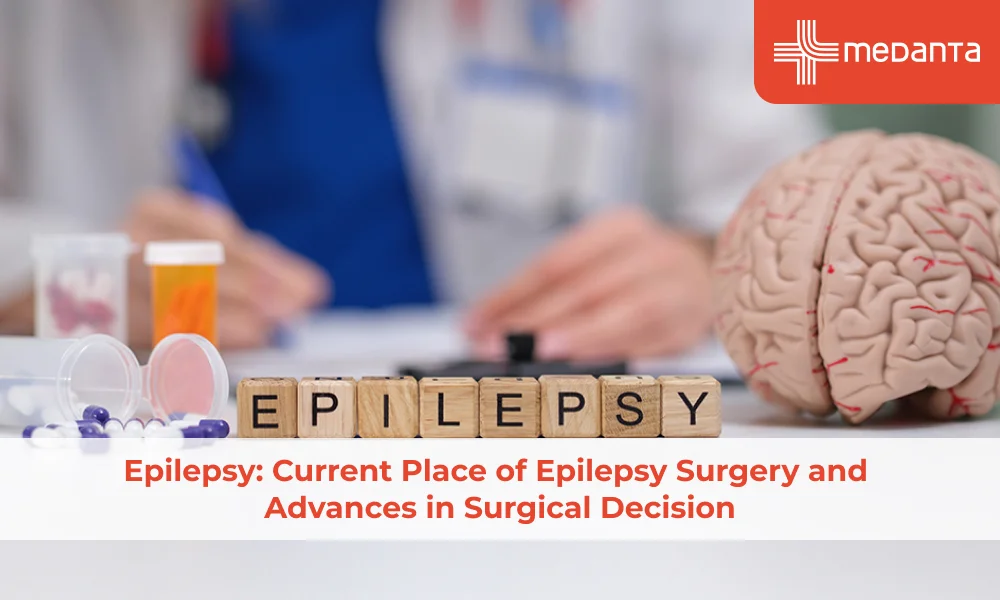Epilepsy: Current Place of Epilepsy Surgery and Advances in Surgical Decision

TABLE OF CONTENTS
What is Epilepsy?
Epilepsy is a chronic disease of the brain characterised by an enduring predisposition to generate seizures, unprovoked by any immediate central nervous system insult, and by the neurobiological, cognitive, psychological, and social consequences of seizure recurrences.
Nearly 80% of people with epilepsy live in low- and middle-income countries. It is estimated that up to 70% of people living with epilepsy could live seizure-free if properly diagnosed and treated. The risk of premature death in people with epilepsy is up to three times higher than in the general population. In the current climate of limited health care resources, the cost-effectiveness of surgical treatment, as compared to pharmacotherapy, must also be considered.
What causes Epilepsy?
Epilepsy is a condition that affects a person's brain and can be caused by a variety of factors. The following are some examples of recognised factors:
Stroke
Brain Tumour
Brain infection
Traumatic brain injury
Genetic disorders
Neurological disorders
What are the symptoms of Epilepsy?
Recurrent seizures are the most common symptom of epilepsy, however there are other signs and symptoms that may indicate epilepsy. These are the following:
Abnormal twitching of one side of the body
Briefly unresponsive behaviours.
Sudden unexplained stiffening.
Sudden chewing or blinking.
Repetitive body movement that appears abnormal.
A sudden fall for no reason
Any repetitive confusional state
Brief abnormal movements during sleep
Sudden jerking of hands with dropping of objects

How is it Diagnosed?
The tests to diagnose epilepsy include:
EEG (electroencephalogram) test
MRI brain (Epilepsy Protocol)
Video EEG
How is it Treated?
There are two ways to treat Epilepsy including:
Medical treatment- The majority of the medical treatment consists of several epilepsy medications.
Surgery - In some cases of epilepsy, surgery is indicated where the epileptic foci can be removed or structurally altered so that the need of medicine can be decreased or sometimes stopped altogether.
Epilepsy Surgery
The Current Place of Epilepsy Surgery
Surgical treatment for epilepsy remains underutilized, due, in part, to misconceptions about this alternative therapy. Rather than promote referral for surgery in future, it would be more appropriate to advocate that all patients with DRE deserve a consultation at a full service specialized epilepsy centre where a multidisciplinary team of experts can offer advanced diagnostic and therapeutic approaches, as well as psychological and social support services to eliminate or reduce disability.
Surgically Treatable Causes of Epilepsy
Following are the surgically treatable causes of Epilepsy:
Tumours (Astrocytoma | Oligodendroglia | Ganglioglioma | DNET)
Cyst (Neuroglial | Arachnoid)
Vascular Malformation (AVM’s | Cavermoma | Sturge Weber)
Infections (Bacterial | Viral | Parasitic)
Mesial Temporal Sclerosis
Rasmussen’s Encephalitis
Engel classification of seizure outcomes following surgical reaction:
Class I: Seizure free or no more than a few early, nondisabling seizures; or seizures upon drug withdrawal only.
Class II: Disabling seizures occur rarely during a period of at least two years; disabling seizures may have been more frequent soon after surgery; nocturnal seizures.
Class III: Worthwhile improvement seizure reduction for prolonged periods but less than two years.
Class IV: No worthwhile improvement; some reduction, no reduction, or worsening are possible.
Advances in Epilepsy surgery has been possible because of:
Advances in Neuroimaging (DTI, MEG, FCD, BOSD).
Advanced MR sequences linked to neuronavigation.
Placement of surface and depth electrodes (latter with neuronavigation – cf SEEG).
Characterization of safe resection even within eloquent brain regions (e.g. Rolandic regions).
Advances in seizure onset detection (e.g. HFO’s, ripples, fast ripples).
Mapping with awake craniotomy, IONM, direct & subcortical stimulation.
Epilepsy is treatable condition with good functional, neurological, psychological outcome for patient.
Medical management is cornerstone of treatment, but some carefully selected cases can be treated successfully with epilepsy surgery.
Consult with Experienced Doctors
Medanta Lucknow has a dedicated team of experienced Epilepsy Treatment Team who work together to optimise patient outcomes. The Neurology team is led by Dr. A. K. Thacker and Neuro-surgery team under Dr. Ravi Shankar, with excellent support and coordination to ensure world class care along with Dr. Shailesh Gupta & Dr. Amitesh Pandey (Neuro anaesthesia), Dr. Deepak R. (Neuroradiology), Dr Shantanu Bharti (Neuropsychology), Dr. Madhumati Goyal (Pathology) and their respective teams.
The treating team is ably supported by a team of well trained paramedical staff, IONM and Neuro Monitoring team for hastened recovery and ably assisted by world class Neuro ICU and Ward Nursing care along with physiotherapy services.






